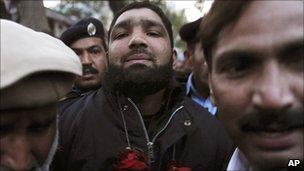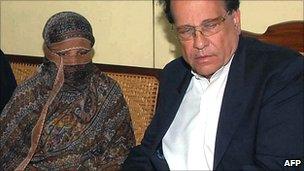Salman Taseer: Thousands mourn Pakistan governor
- Published
The BBC's Aleem Maqbool on Salman Taseer's funeral, covered live on local TV
Thousands of Pakistanis have attended the state funeral of assassinated Punjab Governor Salman Taseer.
Prime Minister Yousuf Raza Gilani joined the mourners in the city of Lahore amid tight security.
Mr Taseer, one of Pakistan's most outspoken liberal politicians, was shot on Tuesday by a bodyguard angered by his opposition to blasphemy laws.
Although many have condemned the assassination, some religious leaders have praised the governor's killer.
The governor - a senior member of the governing Pakistan People's Party (PPP) - had recently angered Islamists by appealing for a Christian woman, sentenced to death for blasphemy, to be pardoned.
Mr Gilani has declared three days of national mourning and appealed for calm.
The bodyguard, Malik Mumtaz Hussein Qadri, 26, was showered with rose petals by supporters as he appeared in court in Islamabad on Wednesday.
Acting alone?
Mr Gilani and thousands of supporters of the PPP attended funeral prayers at Governor's House in Lahore.
Mr Taseer's coffin was then taken by helicopter to a graveyard in a military zone.
Security was intense and the city virtually shut down.
The assassination has drawn condemnation from around the world.
However, some Pakistani religious leaders have praised the governor's killer and called for a boycott of the ceremonies in Lahore, says the BBC's Orla Guerin in Islamabad.
One small religious party, the Jamaat-e-Ahl-e-Sunnat Pakistan, warned that anyone who expressed grief over the assassination could suffer the same fate.
"No Muslim should attend the funeral or even try to pray for Salman Taseer or even express any kind of regret or sympathy over the incident," the party said in a statement.
It said anyone who expressed sympathy over the death of a blasphemer was also committing blasphemy.
The Pakistani Taliban - Tehreek Taliban - also said anyone offering prayers for Mr Taseer would be guilty of blasphemy.
Speaking to the BBC, its deputy chief, Ehsanullah Ehsan, also warned religious scholars not to change their stance on blasphemy laws.
The bodyguard Malik Mumtaz Hussein Qadri was detained immediately after the shooting at Kohsar Market in Islamabad. He confessed to the murder, said Pakistan's interior minister, Rehman Malik.
At his first court appearance in Islamabad the guard was showered with rose petals by sympathetic lawyers and hugged by other supporters.
He was remanded in police custody and is due back in court on Thursday on charges of murder and terrorism.

Suspect Malik Mumtaz Hussein Qadri was garlanded and hugged at court in Islamabad
After leaving court he stood next to an armoured police van wearing a garland of flowers given by a supporter and shouted "God is great".
Police are now questioning the rest of Mr Taseer's security detail and are also carrying out an inquiry into the governor's security arrangements.
"We will investigate whether it was an individual act or there is some organisation behind it," Mr Malik told a news conference.
The BBC's M Ilyas Khan says the questions being asked at the moment are whether the killer acted alone and why other members of Mr Taseer's security team did not try to prevent the assassination.
There are few credible explanations as to why the guard was able to empty two magazines of his sub-machine gun at the governor without being shot by his colleagues, our correspondent says.
Death sentence
UN Secretary General Ban Ki-moon, UK Foreign Secretary William Hague and US Secretary of State Hillary Clinton were among those who condemned the killing.
Pakistan's high commissioner to London, Wajid Shamshul Hassan, told the BBC's Newshour programme that Pakistan would not allow itself to "be held hostage by a minority of [radical] religious people".

Mr Taseer angered Islamists with his support for Asia Bibi (left)
"We will be tough on them. Unless we get rid of such people in our society... you can't feel that justice will be done."
Mr Taseer had called for a pardon for Pakistani Christian woman, Asia Bibi, who was sentenced to death for insulting the Prophet Muhammad during an argument with other farmhands in a Punjab village in June 2009. She denies the charge.
Critics say the blasphemy law has been used to persecute minority faiths in Pakistan and is exploited by people with personal grudges.
Pakistan's government last week distanced itself from a private member's bill which seeks to amend the law by abolishing its mandatory death sentence.
The death of Mr Taseer - a close associate of President Asif Ali Zardari - is the most high-profile assassination in Pakistan since former Prime Minister Benazir Bhutto was killed in December 2007.
The PPP-led government has been under considerable threat in recent times. One of its coalition partners walked out at the weekend.
The International Monetary Fund (IMF) is withholding the latest tranche of its $11.3bn loan to Islamabad, while petrol prices have increased sharply and chronic fuel shortages are causing unrest.
Pakistan is also under pressure from the US to move against militants in the tribal areas bordering Afghanistan.
- Published5 January 2011
- Published4 January 2011
- Published4 January 2011
- Published3 January 2011
- Published3 January 2011
- Published7 December 2010